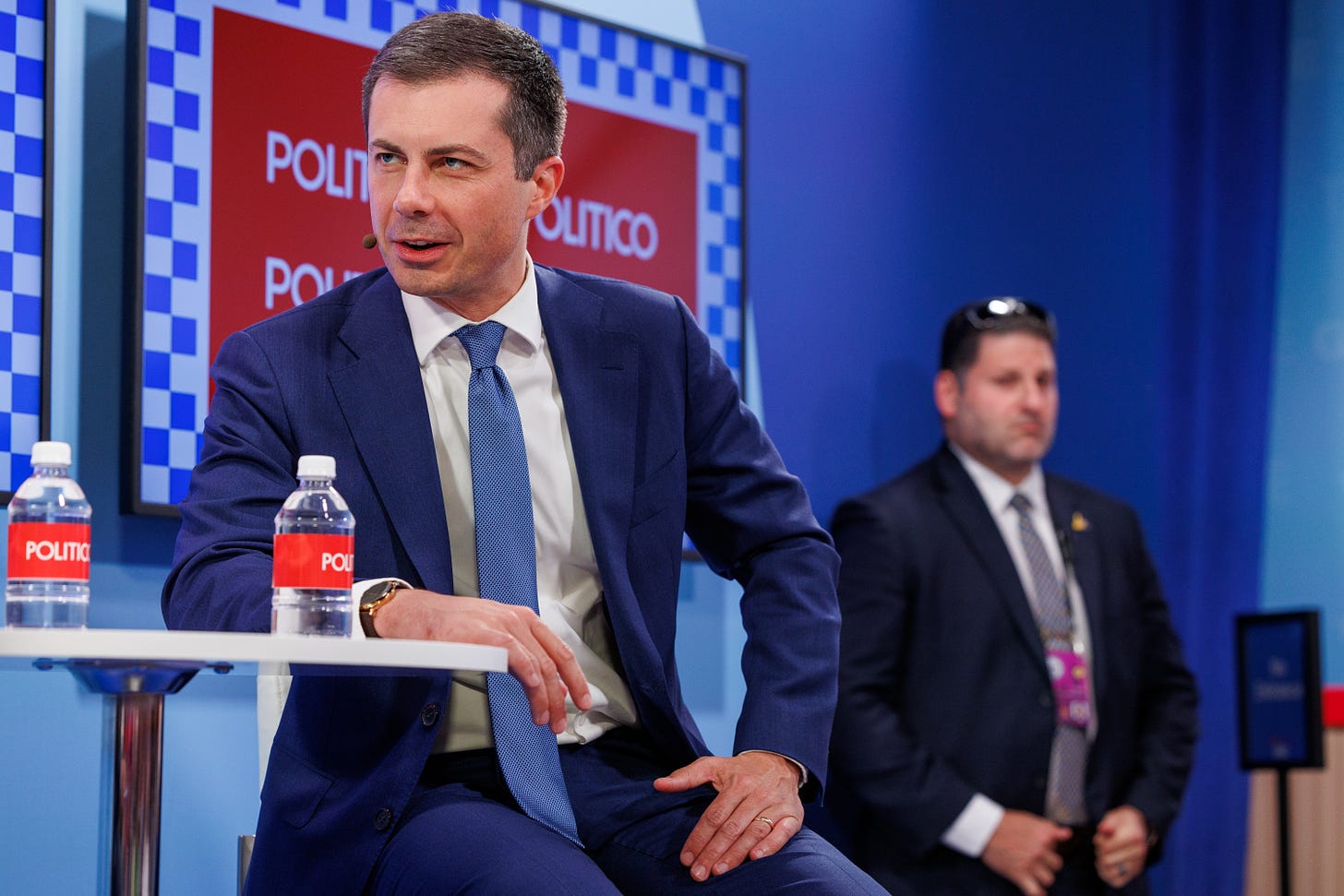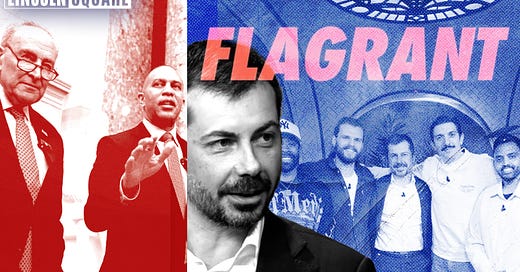What Pete Buttigieg's Podcast Appearance Can Teach Dems about Messaging
Democrats have hemorrhaged support from young men. Pete Buttigieg is one of the only party leaders who gets how to win them back.
The episode of Andrew Schulz’s “Flagrant” podcast featuring former Transportation Secretary and presidential candidate Pete Buttigieg dropped last week and Pete hit a fucking grand-slam.
Schulz is a stand-up comedian and podcaster who represents a large segment of the population that either didn’t vote in the last election or voted for Trump out of spite of Democrats. Think of him and his group of buddies as the non-conspiratorial version of Joe Rogan’s podcast for those of you that are unfamiliar. They exist in the realm of the same media, but are younger and more culturally in tune while also generating millions of weekly viewers and listeners.
The people who watch these podcasts are members of society who don’t feel heard by politicians and have grown to distrust them and government as a whole. Democrats have steered clear of appearances on podcasts such as Flagrant, The Joe Rogan Experience, and others because they tend to misconstrue exactly what they are.
While we recognize that Rogan is long gone into Elon Musk’s asshole and conspiracies, comedians and podcasters such as Schulz and Theo Von are going to be mainstays of the social discussion and media world — whether you like it or not. They draw in millions of viewers multiple times a week. And as Buttigieg acknowledged in his appearance, a lot of them get their news on society and everything else from shows like theirs. The former secretary brought up the point that back in college he was getting his news more from “The Daily Show” on Comedy Central than a network like CNN. This is a reality that Democrats are going to have to acknowledge if they want to reach young working-class voters.
Mainstream media and establishment Democrats have put out a narrative that the podcast sphere as a whole is racist, right-wing, misogynistic, and a place to avoid at all costs. In some cases this might be true and they should continue to avoid shows and hosts like Alex Jones, Andrew Tate, Charlie Kirk, and other conspiratorial assholes. But we do need to recognize that as a whole, Democrats need to make an effort to reach a larger national audience.
During the interview, Buttigieg pointed out that during his 2020 presidential campaign, he would talk to anyone who would have him because he was a mayor from Indiana and ended up doing shows like Iowa College Lesbian Sports Radio, because that’s what politics is supposed to be: meeting with everyone and coming together to decide on how to move forward and where to spend tax dollars even if you don’t agree or see the world the same. “More people agree with us more of the time than not,” Buttigieg said.
The interview covered a wide variety of topics that you would expect, from tariffs to transportation. But each time, the conversation came back to Democrats’ messaging and the frustration surrounding it — almost like the hosts wanted to root for this team.
“What are your ideas that are going to satisfy the concerns that people felt? You just told me all these things that I also want, so now we’re together. … We both want the same things, but you didn’t give me the solution to the feeling that I have. I, too, want a safe home. … A lot of Americans are at the end of their hope and at the end of their trust.” - Schulz to Buttigieg
The hosts of Flagrant are made up of Schulz, Akaash Singh, AlexxMedia, and Mark Gagnon, a multicultural group of young men who comment on all things social and political with a comedic flair. Each one of them time and time again agreed with every proposal and method of government action that Buttigieg suggested taking, they were just driven away by the Democrats’ lack of messaging and results.
This is where Buttigieg shines, we have all seen him in clips of his Fox News appearances where he abuses them with facts and relatability, which is crippling for them. Buttigieg recognizes that the guys he’s sitting with are both immature and genuinely concerned and curious about issues that affect everyday Americans; they showed up prepared and asked thoughtful questions that their audience would be concerned about.
He takes gay jokes in stride, recognizing that they are made in a sense to make him one of the boys and he masterfully steers the conversation back toward policy and messaging after joining in to make a Republican Grindr joke. The hosts watch intently and respectfully as Buttigieg uses a story about coming out in an Indiana community that might not be as accepting as others.

When a conservative woman he knew met his now-husband Chasten, she said, “I met your friend and he’s just wonderful.” Buttigieg suggested that was signaling something very big for that woman because he could guess how she had probably talked about gay people all her life. But she knew Pete and met Chasten and thought they were wonderful … But imagine, Buttigieg said, if he had treated her to a lecture on the phrasing of “friend vs. partner” and how that would’ve come across and driven her right back to ignorance.
These are the opportunities for messaging that Democrats are missing by leaving out a portion of the population in the discussion and has led to a growing distrust over the past 10-plus years during which Trump has gained momentum. Republicans have a stranglehold on media messaging which has largely blamed Democrats for government failures and stuck. Whether they like it or not, this needs to be addressed … and reaching out to a wider and younger audience is a start.
In the interview, Buttigieg points out that Democrats are prone to finger-wagging. He said, “You get this sense of moral conviction and you’re so sure of it, that you start to think it makes it OK to be an asshole.” That’s been largely true of older Democrats who have constantly told voters that they know better while failing to deliver on progress. Voters who aren’t showing up or have moved toward the right over the last decade felt betrayed by that, but there is a chance to shift the narrative.
Buttigieg points out that you have to meet people where they are at and not where they should be. And that’s what I think that a lot of people with such moral conviction fail to realize. You know the change is right and you want it to be fixed so bad that everyone needs to fall in line right away. But, like that woman who told Buttigieg that his “friend was wonderful,” we need to accept people for where they are and show them how to move forward.
As both the Democratic Party and the voting population becomes younger, Democrats have to realize that not all of these new forms of media are bad. They represent people who feel unheard and unseen and they get that from podcast hosts such as Schulz, Theo Von, Barstool and others. There is a chance to reach and motivate an entire block of the 90 million people who felt unmotivated to vote in the last election. We can’t judge them for the reason they didn’t vote, we have to meet them where they are.
At one point, Buttigieg was speaking of how we actually used to have mandates in elections in our country but now we largely have 50/50 elections because people feel let down and only motivated party loyalists are voting. He pointed out that Democrats should aspire to be a 60/40 party, meaning they should have a consistent 20-point win in national elections due to the popularity of the things they want, but they just have to get the messaging right. To which Schulz responded: “Why aren’t they agreeing with you if you’re right?"
AOC, Bernie Sanders, and Buttigieg are wildly popular and effective in their messaging in a time when the people want it and the party as a whole needs to get behind this. Buttigieg is right; they should be expecting 60/40 wins from here on out because Schulz and his band of misfits, along with other podcasters and their millions of fans find these policy positions very popular. They just want the elected officials to listen and relate.
We don’t know who the ‘28 candidate will be, whether they’ll burn it down before the midterms, or what … But what we learned today is that there’s an even larger section of the population waiting for Democrats to sound more like them and be a whole lot louder. As the party grows younger and candidates start to become more visible before next year’s midterms, there needs to be a concerted effort to cast a wider net. And not in the mode of Gavin Newsom inviting these people on his show, but going out and spreading a well coordinated message and meeting them where they are.
Read the original article here. And read more of Evan Field’s work on his Substack.







I watched the entire almost 3 hour podcast, and it was so worth it. I admit, as a fellow Hoosier and being from a town very close to South Bend, I'm totally biased towards Mayor Pete (yes, we still call him that). But he really is well spoken, and doesn't rattle easily. He doesn't take the bait when someone tries to get under his skin. I'm just waiting to see what he does next.
Excellent article!! Now we need about 100 other Democrats to understand and learn from Pete Buttigieg & to get out there and get their asses busy!!